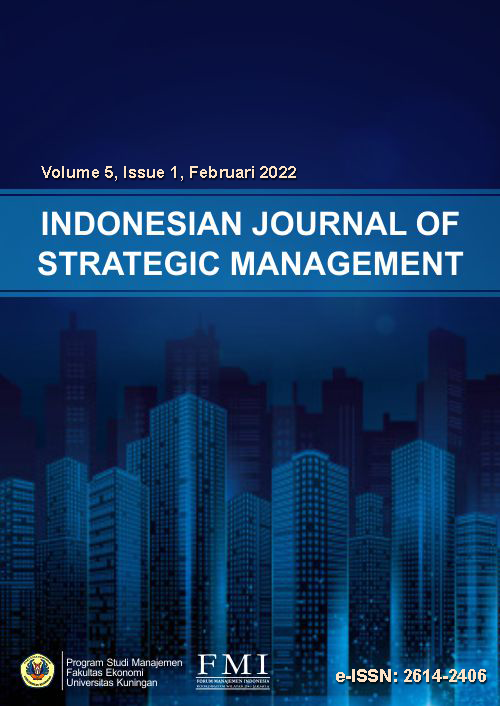PENGARUH DEMOGRAFI DAN LITERASI KEUANGAN TERHADAP PRAKTIK MANAJEMEN KEUANGAN PERSONAL (Studi Kasus Pada Guru Pegawai Negeri Sipil di Kabupaten Kuningan )
Abstract
The objective of this study were to examine the influence of demography and financial literacy on personal financial management practice. Demographics in this study were devided into dimensions of gender, education level, age, number of dependents and salary class. While financial literacy was devided into financial Knowledge dimension, financial behavior and financial attitude. The amount of samples used were 375 teachers with Cluster Proportional Random Sampling. Logistic Regression with SPSS 19 and Minitab 16 used as technique of analysis. The analysis showed that gender, education level, age, number of dependents, salary class, financial knowledge, financial behavior, and financial attitudes together had a significant effect on personal financial management practices. Mean while, partially only the variables of age, number of dependents, salary class, financial knowledge (financial knowledge), and financial behavior have a significant effect on personal financial management practices. Meanwhile, the variables of gender, education level, and financial attitude partially have no significant effect on the personal financial management practice of PNS teachers in Kuningan Regency. The magnitude of the contribution or the influence of the variables of gender, education level, age, and salary group, financial knowledge, financial behavior, and financial attitude personal financial management practice is 42.1%, the rest the remaining 57.9% is the contribution of the variables outside the model.
Keywords : gender, education level, age, numbers of dependent, salary class, financial knowledge, financial behaviour, financial attitude, personal financial management practice.
References
Anderson, C., Kent, J., Lyter, D. M., Siegenthaler, J. K., & Ward, J. (2000). Personal finance and the rush to competence: Financial literacy education in the US. Journal of family and consumer sciences, 107(2), 1-18.
Atkinson, A. and F. Messy. 2012, Measuring Financial Literacy: Results of the OECD / International Network on Financial Education (INFE) Pilot Study. OECD Working Papers on Finance, Insurance and Private Pensions, No. 15, OECD Publishing. http://dx.doi.org/10.1787/5k9csfs90fr4-en.
Bowen, C. F. (2002). Financial knowledge of teens and their parents. Financial counseling and planning, 13(2), 93-102.
Falahati, Leila and Laily H. Paim. 2011. Toward a Framework of Determinants of Financial Management and Financial Problem Among University students. African Journal of Business Management Vol. 5(22), pp. 9600-9606, 30 September, 2011. http://www.academicjournals.org/AJBM DOI: 11.5897/AJBM11.1293.
Gujarati, Damodaran N., and Porter, Dawn C. 2009. Basic Econometrics. Fifth Edition. McGraw Hill. New York.
Hilgert, M. A., Hogarth, J. M., & Beverly, S. G. 2003. Household financial management: The connection between knowledge and behavior. Federal Reserve Bulletin (July), 309-322.
Hogarth, J.M. 2002. Financial literacy and family and consumer sciences. Journal of Family &Consumer Sciences, 94(1), 15-28.
Keuangan, O. J. (2014). Strategi Nasional Literasi Keuangan. Jakarta: direktorat literasi dan Edukasi.
Klapper, Leora, and Georgios A. Panos. 2011. Financial Literacy and Retirement Planning in View of a Growing Youth Demographic: the Russian Case. CeRP Working Paper, No. 114/11.
Krishna, A., Rofaida, R., & Sari, M. (2010, November). Analisis tingkat literasi keuangan di kalangan mahasiswa dan faktor-faktor yang mempengaruhinya (Survey pada Mahasiswa Universitas Pendidikan Indonesia). In Proceedings of The 4th International Conference on Teacher Education (Vol. 4, No. 1, pp. 552-560).
Nidar, S. R., & Bestari, S. (2012). Personal financial literacy among university students (case study at Padjadjaran University students, Bandung, Indonesia). World Journal of Social Sciences, 2(4), 162-171.
Parrotta, J. L., & Johnson, P. J. (1998). The impact of financial attitudes and knowledge on financial management and satisfaction of recently married individuals. Journal of Financial Counseling and Planning, 9(2), 59.
Prawiro, R. (2021). Pengaruh Keadaan Demografi Sosial Ekonomi Terhadap Manajemen Keuangan Pribadi Melalui Literasi Keuangan Pegawai Blud Rsud Bayung Lencir. Jurnal Manajemen Terapan Dan Keuangan, 10(01), 16-28.
Rajna, A. R, WP. Sharifah Ezat, Syed Al Junid and H. Moshiri .2011. Financial Management Attitude and Practice among the Medical Practitioners in Public and Private Medical Service in Malaysia. International Journal of Business and Management. Vol. 6, No. 8; August 2011.
Wachjuni, W., Komarudin, M., Maulana, Y., Azhari, A., & Astriani, R. (2022, August). Analysis of Factors Affecting Financial Behavior. In Proceedings of the 2nd Universitas Kuningan International Conference on System, Engineering, and Technology, UNISET 2021, 2 December 2021, Kuningan, West Java, Indonesia.
Wiharno, H. (2015). Karakteristik Sosial Ekonomi yang Mempengaruhi Literasi Keuangan serta Dampaknya terhadap Manajemen Keuangan Personal (Survei Pada Pegawai Negeri Sipil Daerah di Kabupaten Kuningan). Jurnal Riset Keuangan Dan Akuntansi, 1(02).

